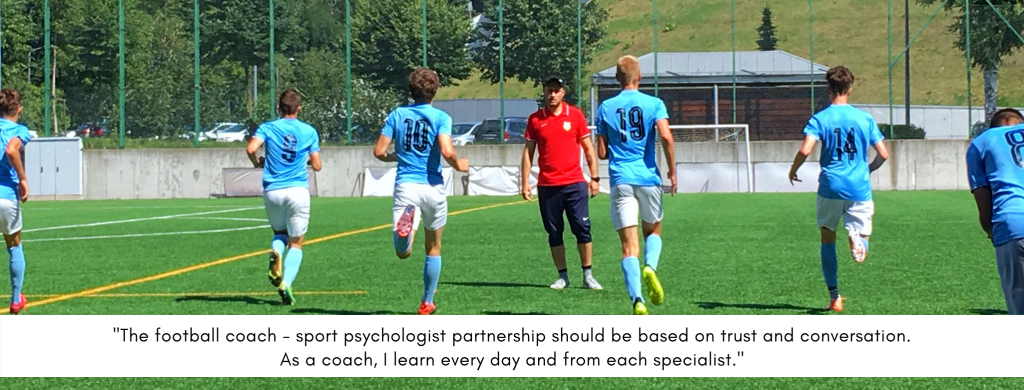
Andrzej Ukleja, certified UEFA B Football Coach
Hello Andrzej. Thank you very much for agreeing to be interviewed for this blog post and for introducing us your football experience. Can you introduce yourself and tell when your journey with football has been started?
Let me start by saying that I come from Jeziorany, a town located 35 km from Olsztyn. I’ve been interested in football for as long as I can remember, but my parents say that from the moment I started walking. I will gladly tell you about my experience in football and share the knowledge that I gained.
Please, tell us a little more about your football experience.
Probably you mean playing in football club. I remember I was less than 10 years old when I became a player of the club from my town – “Coal-Bud”, now it’s called MKS Jeziorany. Playing football and watching matches on TV, I started to be interested in the specificity of the football coach. At the age of 14 or 15 after training, I started taking notes at home, and also I was talking with coaches about their training methods and ideas for the team’s playing. First time I had a contact with the “coaching” before my 20th birthday. I became an assistant first football coach, it was a youth team. That’s how my adventure as a football coach has started. At that time I was still an active player and I was combining playing with coaching. So you can see that the path from the player to the coach was the in the natural order.
Could you explain more about the work as an amateur? How does it look from the practical side?
Contrary to appearances, the „work” of an amateur coach is not idyllic. Because there is a lot of work, and practically no profits at all, because coaches receive PLN 500-600 remuneration working with youth groups, and about PLN 1000 with seniors. The practical experience shows that football coach has a lot of work to do… starting with the organization of trainings, their implementation, through arranging transportation and water when there are away matches; ending with paperwork, for example: printing, distributing and collecting player application forms for entertainment before each round. It should also not be forgotten that coaches often do not have football team managers in the team and have to fill in the match reports themselves and other important documents.
What is missing or what would you change?
I think that each of the amateur coaches would probably change many things. The realities in the lower leagues are like we see and we will not change it. Money rules everything and the lack of money is the biggest problem; although last years showed that there is more funds, but there is a shortage of children and teenagers with „character”.
Have you ever had a chance as a coach to cooperate with a sports psychologist?
Unfortunately, I have never cooperated with that specialist, both as a coach and even before as a player. Probably because the teams from lower leagues do not think about that cooperation; not only with a sports psychologist, but also with other specialists. This is due to various factors, including the fact that amateurs play for fun and train as much as time allows.
Do you think the role of a sport psychologist in the training staff might be important?
There is no doubt about it. We can see that the world is changing – not only „football world”. Children are less and less interested in sports, because they prefer to sit in front of the TV or computer, and often their parents do not react to it. And when they play sports, they collide with a different reality than in the virtual world. The role of a sport psychologist is to work on the awareness of a young person and learn them how to find themselves in the group, both in the locker room and on the pitch. I believe that the work with adult players is the same. The pressure of the environment and the media makes the players unable to show everything they can do. Here, the psychologist, as a right hand of the football coach, has a lot of things to do, I mean to reach their mentality.
Do you think that sport psychology and mental training can help in football training?
As I said before, I have never had a personal contact with a sport psychologist. Of course, I read about mental training and I watched how that training looks like. On this basis, I can conclude that mental training helps players to rise to the higher level of the game. Everything, of course, depends on their commitment and willingness to increase awareness of their own shortcomings.
Working with a sport psychologist, what would you expect from that specialist? Who would be responsible for what? How do you think that cooperation could look like?
That cooperation should be based on trust and conversation. As a coach, I learn every day and from each specialist. The psychologist would be responsible for the psychological sphere of players, covering all mental aspects, from building self-confidence to communicating their needs and problems.
It is said that the coach is also like a psychologist. You are close to the players, you spend a lot of time with them. What’s your way to get to their “heads”?
Each player is different. I need to get to know them better in individual way, to be able to give them a place in the team and feel good there. Not all of them are players who will be a part of the team. Sometimes they have problems with self-confidence, they feel less confident in what they can do. Some people need more time to acclimatize. As a coach, I assume that there are two types of psychological approach to the player.
You mentioned that there are two types of mental approach to players. Please explain what you mean. Do you think that conversation between the coach and the player can influence them during a training or a match?
Both approaches are based on communication with the player. I divide them into those in the training day and those in the match day. In both cases, everything starts through the observation of the player before training/match. If you know your players, you know which one has a bad day. Then it is good to talk privately, face to face. During the training, them bad day might not matter as much as in the match day. However, I always try to correct mistakes when they appear by suggesting and pointing to various solutions. Therefore, during the match day, it is up to the coach to properly set the mentality of the player and the entire team. There is no space for mistakes during the match. If they occur, they must be eliminated as soon as possible. Even by changing players, which probably no one likes. Here we come back to the communication between the coach and the player, and the appropriate mental attitude of the player.
